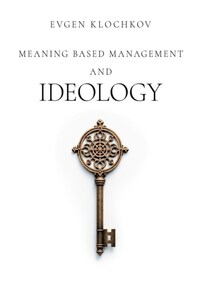“The world is not ruled by words and laws, but by signs and symbols.”
What factors contribute to success in business? This book reveals how an organization’s ideology can be a key factor in achieving business success. I illustrate how meanings can facilitate the transformation of an ordinary team into a cohesive entity, and how beliefs can serve as a driving force in achieving objectives. I illustrate how a comprehensive definition of overarching objectives and a transparent articulation of values can motivate employees to achieve new heights and become a pivotal element in business success.
This book is intended for executives, entrepreneurs, and managers seeking innovative strategies for building an efficient and profitable company over the long term. You will gain insight into how meanings and beliefs can propel you to the next level. This book serves as a personal guide and practical instruction manual. This book provides practical tools and techniques for implementing ideological principles in your business. You will learn how to develop a clear ideology and implement it to achieve optimal results. I will demonstrate how an organization’s ideology can significantly influence its business strategy and how it can be leveraged to gain a competitive advantage.
I will present to you a practical model that I have been utilising for many years in my business projects. This model will enable you to rebuild your organization, placing the principles, values, and ideas that form the basis of its structure at its core. In this case, while the organization will remain externally the same, it will be internally transformed into something new, with a completely different potential and opportunities.
Before I begin, I will provide some context about my own experience to illustrate the circumstances that prompted me to seek solutions. I will outline a number of straightforward yet highly significant concepts, namely responsibility and the planning horizon. Without this foundation, it will be challenging to build a high-level organization that is not only invulnerable but also anti-fragile. We
will transition from philosophical concepts of mission to tangible, operational business tools, including processes and job descriptions. We will explore the intrinsic link between these elements and how a company’s mission provides a foundation for all activities. Let us begin.
I am a staunch proponent of these concepts and do not align with the perspectives of those who have not encountered the circumstances they describe. When a person discusses business, I always look to gain insight into their experience in the industry by reviewing their biography. If he lacks experience in commercial structures but offers consultancy, his advice may be valuable but is unlikely to reflect reality, particularly in the Russian context. While other areas of knowledge may operate differently, in business, where I have spent over 20 years, this approach has proven effective.
Please allow me to provide you with some background information about myself. I began my career in sales at the entry level and started as a salesman in a small Canon store. After three months, I was recognized as a promising member of the sales team and presented with an award at the Hollywood Nights club in St. Petersburg, a memento I still retain. Six months later, a conflict arose between the owner and the manager, resulting in the entire sales department being forced to seek alternative employment. My subsequent position was with an automotive products company. I enjoyed the sales role, particularly the personal sales and negotiation aspects. I was keen to pursue a career in this field. Over time, I had the opportunity to work with some of the most accomplished professionals in the field, which allowed me to gain valuable insights and expertise. I gained my experience through hands-on learning. It was challenging, but always engaging and driven. One of my mentors once informed me that at the age of 25, he had already assumed the role of commercial director, and that I would have approximately a year and a half to reach that same level. A few months before my 26th birthday, I was appointed Commercial Director of a small St. Petersburg company that was part of a large logistics holding company. In 2006, I was engaged in high-risk driving in a sports car with street racers, attending the most exclusive nightclubs, and the bartender at a popular bar on Nevsky knew me by sight and would inquire about my usual drink order. For an individual who had departed from the confines of a military academy four years prior, this represented a notable achievement. At least I was not aware of any other individuals who had pursued a comparable career trajectory.
During the summer months, I utilized my sports car to navigate to Crimea, with a subsequent transit through Moscow. Moscow made a significant impression on me, particularly in terms of its sheer scale and pace of operation. I came to the realization that my life would never be the same and that I would have to relocate. It was a decision with no clear destination and no guarantee of success. I was forced to relinquish my vehicle and all my personal belongings. I required funds for the relocation and, for the first time in Moscow. It was unclear how long this initial period would last. On September 26, 2006, at 7 a.m., I was at the Leningradsky station in Moscow, calling newspaper ads for renting an apartment. Indeed, the advent of the internet, mobile phones and property search platforms has transformed the way we search for and rent properties. At the time, renting an apartment in Moscow was a challenging process. I viewed the first apartment in the afternoon and the second in the morning at 11 a.m. I was fortunate that the second option proved to be a suitable match for my needs, despite the landlord’s reluctance to negotiate. Despite the lack of a bed due to the apartment’s recent construction and incomplete furnishing, I accepted the offer. I was without accommodation and required to purchase an air mattress and other necessary items at Mega Mall. However, this did not present a problem as I was able to establish myself in the capital city.








